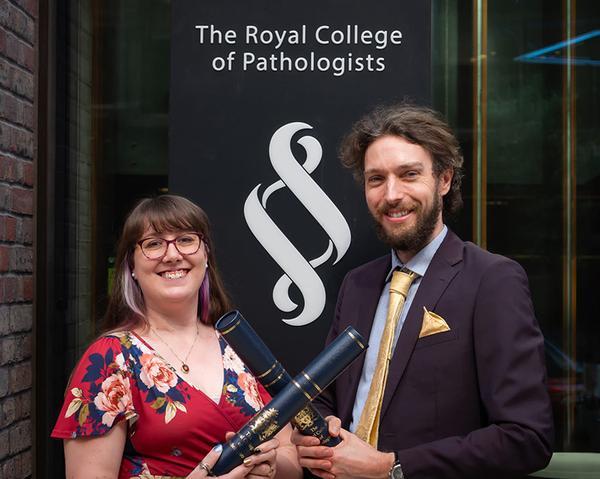Over 250 UK and international candidates passed their exams this year. Plymouth-based pathologists Sarah Grenfell and Adam Douglas were part of the 2023 cohort. They discussed their journey to becoming pathologists and fellows and the positives that come with it.

Why did we choose pathology?
Sarah: I decided as a GCSE student that I wanted to be a forensic pathologist after reading the autobiography of Professor Keith Simpson. In working out how to become a forensic pathologist, I learned that I would first need to get a medical degree and then study histopathology for a time before further specialising. By the time I’d finished ST1, I realised that I preferred pathology’s diagnostic side and have since dropped post mortems altogether.
Adam: I was not too fond of pathology during my first 2 university years. It was only after spending time at a pathology department during a student-selected component that I really got to grips with what pathology involved and came to love the specialty. I have never looked back since then.
Why did we choose our specialties?
Sarah: I have chosen to subspecialise in gastrointestinal (GI), head and neck, and medical renal pathology. I enjoy the routine GI work and find the cut-up side of the head and neck fascinating, but my heart lies in medical renal. I love taking the time to carefully comb over each slide, looking for the tiny details that will give me my answer and then reading textbooks to see if what I’m seeing fits what would be expected in that condition. I also enjoy the renal multidisciplinary team meetings and our relationship with our clinical team.
Adam: I have been interested in thoracic pathology since an academic foundation placement in digital pathology, mainly focusing on lung cancers. I enjoyed the specimen dissection (except the staples), and it helped that the department needs more lung pathologists, not to mention the team is excellent. I am also taking on medical liver, hepatobiliary and GI pathology.
What has it been like studying at the same time?
Sarah: It’s been great! I have a permanent study partner who has kept me motivated. Adam is much better at exams than me, so he was able to help me get through Part 2. It also really helps to have someone who knows exactly what you’re going through to support you and help you focus on your revision. We also had our consultant interviews on the same day, so it was nice to prepare for that together.
Adam: Working towards exams together was quite motivating. We would commit to at least an hour each evening of looking at slides on the Leeds website with breaks when we could take no more slides. Having someone who is going through the same thing definitely makes a difference.
What has it been like working at the same trust?
Sarah: I know some of our friends think we’re mad for working in the same specialty and department, but I think it works. We don’t share an office, so we get some time apart, but it’s nice to come home and discuss interesting cases we’ve had with each other.
Adam: We are the cool people who discuss interesting cases at home. It’s hard to escape from, but we are genuinely interested in pathology and mostly agree. Working at the same hospital only a few miles from home is great. We cycle to work daily, bring our daughter to nursery with a bike trailer, and are only 20 minutes from home.
What advice would you give future candidates and what do you wish you had known?
Sarah:
- Work out your learning style early on. I thought I worked best by reading books, but it turns out that just looking at hundreds of slides of online teaching sessions worked better in the end.
- Embrace cytology! I worked with a fantastic consultant biomedical scientist cytologist who taught me everything I know about cytology and instilled a love of Giemsa in me. It made the exam a breeze.
- I wish I’d known about coaching before attempting the Part 2. Our trust offers life and exam coaching for free, and a couple of sessions completely changed my approach and outlook for the better.
Adam:
- Volume! See as many cases as you can see. Digital is good, but the exam is glass-based for now, so make sure you’ve seen loads and ask colleagues for exam-style cases within your department.
- Courses are not the be-all and end-all. If you attend more than one, you’ll see the same themes emerge, and nothing beats seeing lots and plenty of day-to-day reporting.
- You’ll never feel entirely ready for Part 2, but as long as you have a plan and work steadily, you’ll be fine. They’re not trying to trick you, so think horses, not zebras.

